HR trends & opportunities for building a world-class workforce
How HR pros are navigating employee recruitment, retention, and engagement in a new era of AI.

-
Employees are the most important asset of any organization—they are the face of your company, ambassadors for your brand, and hold the keys to positive relationships with your customers and the marketplace.
Finding, hiring, and retaining good people is a big job. It requires an ability to constantly monitor internal operations for improvements and look externally to track trends. From identifying talent to pulling together a compelling benefits package; understanding the value of DEI and anticipating the impact AI, HR professionals have to be on top of just about every aspect of what makes a company tick.
Our post-pandemic workplace and a volatile job market has made the job even more complex. How are HR teams handling the changes?
We decided to go directly to the source to check in on the state of HR. In a recent survey of U.S. HR professionals¹, we learned about the state of their business—what they feel optimistic about, their concerns, and their thoughts about the most important developments facing their organizations. Read on to learn more.
In this report
CHAPTER 1
How successful HR teams are finding a seat at the table:
• The role of HR
• Key HR metrics
• Burnout & turnover
CHAPTER 2
Surprising insights about compensation, feedback, and hiring:
• Feedback a vital tool
• Engagement & retention
• Employee investment
CHAPTER 3
Keeping a pulse on top-of-mind HR trends:
• DEI an ongoing challenge
• Recruiting gets a lift
• AI and HR
CHAPTER 1: THE REALITY
How successful HR teams are finding a seat at the table
The split: HR’s impact multiplies in companies where it’s seen as vital
HR teams have had to navigate dramatic changes to the workplace, a conflicted and emotional workforce, and unpredictable market pressures. That’s why top companies develop highly skilled people teams, and hire C-level HR leaders that have a seat at the executive table. For these companies, HR is the lifeblood of the organization, an integral part of decisions, and an added value at all levels.
But, that’s not the story everywhere. In our study we found that HR is split on how they are perceived and their ability to make an impact. Just over half (53%) of HR professionals say leaders in their company view HR as vital to the culture of success. The remainder say company leaders perceive HR’s role as strictly operational.
When looking at responses from people who said their company views HR’s role as vital or merely operational, stark differences emerged in the impact, expectations, and even the performance of HR teams.
Take, for example, the impact HR has on shaping company cultures. Over two thirds (67%) of HR professionals overall say their organization plays a leading role making decisions that impact the work environment, compared with only 32% who say HR only has some influence.
But when you look at the split between companies where HR is seen as vital vs. operational, this gap widens dramatically. At the companies where HR is seen as vital, 72% say HR plays a leading role in shaping the work environment, compared to 61% at companies where HR is seen as merely operational.

Or look at the increased importance the pandemic has placed on HR teams. While 67% of HR pros overall say they play a larger role in the employee experience since the beginning of COVID-19, this number is far higher in organizations where leadership recognizes HR as vital (73%) and lower in those that do not (61%).

Similarly, almost seven out of ten (68%) of HR professionals overall cite higher expectations from leadership since the pandemic, and that number reaches 73% at companies where HR is vital.
Investment in employees lags behind growing expectations for HR
Despite HR playing a larger role, companies risk lagging behind in support for employees. One in five (19%) HR professionals say their company does not invest enough in employees.
Almost a quarter (24%) of HR pros at companies where HR is seen as operational underinvest in employees. This number is much lower (15%) at companies where leadership views HR as vital in creating a culture of success.
Key takeaway: companies need to follow up their high expectations with funding and support for employee development that will ultimately support company success.
Pressure to deliver on all metrics is real
What matters to HR? Everything. In our study, 5 out of 8 metrics rose to the top, pointing to the fact that HR pros can’t let a single ball drop. From recruiting to engagement, training to retention, HR needs to make sure that all parts of the employee lifecycle are functioning in a way that delivers good outcomes.
In our study, 45% of HR pros ranked employee performance management at the top of the list. This was closely followed by recruiting and retention (45%), however there are other equally as important HR measurements that respondents cared about.
The split between HR organizations seen as vital vs. operational was in full display in these results, as well.
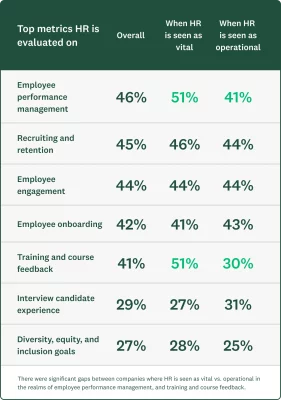
In companies where HR is considered vital, two metrics stood out as particularly important. Training/course feedback and employee performance management both topped the list of vital measurements at 51%. At companies where HR is considered just an operational function, these two areas ranked lower than average, at 30% and 41% respectively.
Takeaway: Companies that value HR also put significantly more value on their ability to support their employees’ performance and development.
Burnout, compensation, lack of flexibility drive turnover
It’s been a rough couple of years for employees as well as HR teams. The reckoning of the pandemic, a massive market adjustment, and layoffs in key sectors, like tech, has rocked corporate America and small business as well.
It might seem surprising that many employees are working with purpose. In a recent CNBC SurveyMonkey workforce study of 8,874 U.S. workers, a whopping 91% of employees say they find their work meaningful. In addition, 85% of employees report being satisfied with their jobs and almost three-quarters (73%) say they are well compensated. These numbers are consistent with previous studies, indicating that despite the churn, employees report to be content.
HR teams clearly see a different side. Employee turnover continues to be an issue for companies—and HR teams have real concerns. Only one in three (32%) HR pros say their company has been ‘very successful’ at addressing turnover.
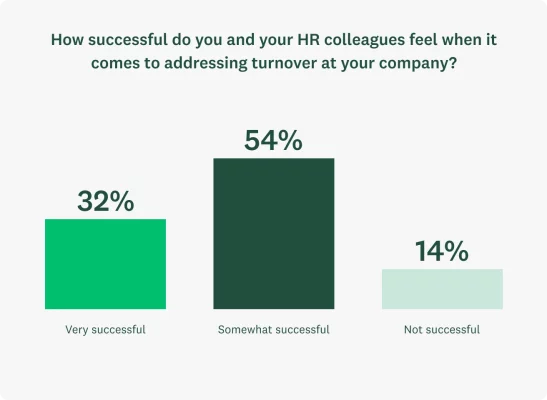
Less than a third of companies have been “very successful” at addressing turnover
The reasons for turnover are many, and vary based on the role of HR at a given company. Overall, compensation tops the list, with over a third (35%) of HR pros citing it as the reason for turnover.
However at companies where HR is seen as vital, burnout is the top reason, coming in at 35% compared to 22% at companies where HR plays an operational role. A lack of recognition is also 2X as high at organizations where HR doesn’t play a vital role.
35% of HR pros cite burnout as the top reason for employee turnover at organizations where HR is seen as vital
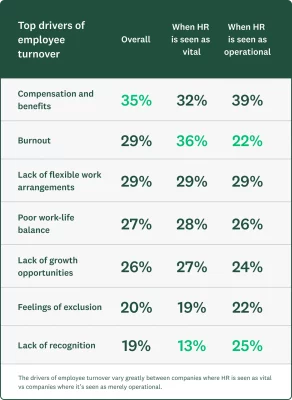
CHAPTER 2: THE BRIGHT SPOTS
Surprising insights about compensation, feedback, and hiring
Feedback is a vital tool for HR teams
The voice of the employee is alive and well at the majority of companies. HR pros ask for feedback consistently and for the most part, frequently. In our study, 85% of HR pros agree their companies have programs that allow employees to provide feedback on a regular basis, with (45%) of HR teams reporting they collect feedback quarterly. For a small percentage of companies (10%), feedback is collected rarely if at all.
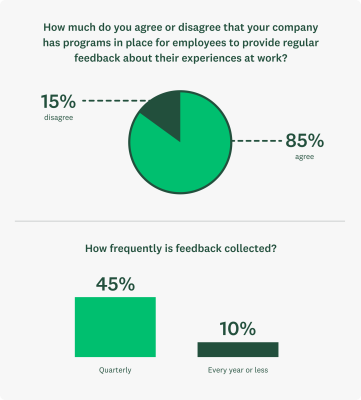
Almost half of HR teams collect feedback quarterly
Only one out of ten companies collect employee feedback every year or less often
That feedback is put to good use. A third (33%) of HR pros say employee feedback drives decisions about the employee experience. In our study, employee feedback carried an equal weight in decision making when compared to decisions being made by leadership (34%) and managers (32%).
33% of HR pros say employee feedback drives company decisions about the employee experience
Employee engagement (48%) is the top reason for collecting feedback and this is even more important in companies that value HR (59%) vs. those that don’t (35%).
For all HR teams, collecting feedback has its challenges. While the majority (59%) of HR pros believe they get the right amount of employee feedback, over a quarter (29%) say they don’t get enough.
The reasons for this are varied. Engagement, siloed information, and lack of insights are the top challenges.
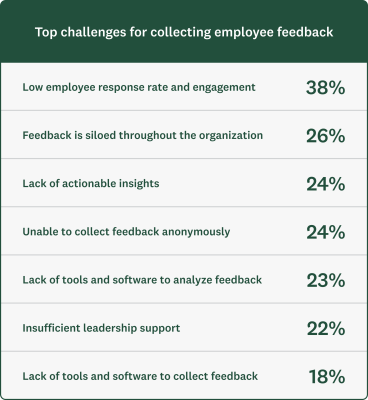
HR pros are also concerned about getting true feedback. According to our study, 72% of HR pros also say they are concerned about employees providing open and honest feedback about their experiences at work. This is more of an issue at companies where HR is not vital; 80% of these HR pros are concerned about candid feedback, compared to 64% of companies where HR plays a vital role.
72% of HR pros are concerned about employees providing open and honest feedback about their experiences at work
Money isn’t everything
Compensation will always be important for attracting and retaining top talent. Salary and benefits speak volumes when it comes to attracting talent and retaining employees.
But for HR teams, there are a few more important areas to invest in. According to our study, employee training surpasses compensation in importance for HR pros at all companies.
Over half (55%) of HR pros believe training is the most important area of investment when it comes to the employee experience. This is closely followed by compensation (54%), and work-life balance (51%).
Amongst companies where HR is considered vital, work-life balance is the most important place companies should invest in employees, with 56% of these companies placing work-life balance at the top of the list, edging out training (55%) and compensation (53%).
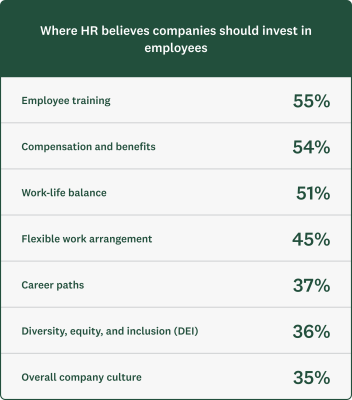
In our recent CNBC SurveyMonkey workforce study, we found employees are torn on flexible workplace options. More than three years after COVID sent workers home, 56% of workers say they expect in-person employees at their company to have better career opportunities–nearly 10 points higher than the optimistic days of October 2021.

Almost half, 49% of HR pros say being able to offer remote or hybrid work has a large impact on their company’s ability to hire.
That’s even higher amongst companies where HR plays a leading role; 58% of those HR pros say hybrid or remote work is important for recruiting, compared to 44% in companies where HR is considered operational.
These takeaways have far-reaching implications for HR teams who are trying to retain good employees, but also for recruiters. The lure of big salaries that often drives acceptance decisions for prospective employees is no longer the only tool HR teams have to use.
CHAPTER 3: THE GAME-CHANGERS
Keeping a pulse on top-of-mind HR trends
DEI is a driving force for recruitment, benefits, and culture
Diversity, equity, and inclusion (DEI) has made it into the mainstream consciousness of most company leadership. Lucky for them, HR got there first.
At many companies, HR teams have been incorporating DEI best practices in all areas of the company; from recruitment to compensation and retention. And for good reason—there are a lot of DEI issues to contend with, and more on the way.
Here are just a few of the stats from our recent research:
- 33% of Asian and Black employees feel they are not well paid for the work they do, compared to 26% of all employees¹
- Only 61% of non-conforming gender employees feel they are well paid for what they do, compared to 73% of all employees¹
- Over a third of Asian, Black, and Hispanic employees are concerned that their jobs will be eliminated by AI compared, to a quarter (26%) of all employees¹
- 62% of employees would rank their advancement opportunities as positive, compared to only 50% of non-conforming gender employees¹
These stats paint a somewhat grim picture for HR teams—even if equity exists, employees' perceptions of inequity are front and center for many different groups. But, our recent study also uncovered some good news.
Hiring is a bright spot for DEI
Recruiting top talent is an important metric for HR pros, and DEI plays an important role in hiring. There’s never been a more important time to make sure that companies are building a workforce that is intentionally diverse and inclusive of a range of attributes. Companies need to find employees of different skill sets, genders, ages, ethnicities, and identity.
Almost half (48%) of HR pros say that DEI has had a large impact on hiring top candidates. This is even higher at companies where HR plays a leading role—55% of HR pros say DEI has had a large impact on hiring.
Is employee input considered in DEI issues?
How much companies ask for input on DEI varies, and HR teams are somewhat split on whether it's a regular best practice or somewhat haphazardly implemented. The findings also differ significantly depending on how HR is perceived at a company.
One in five (20%) HR professionals say that their company does too little to address employee feedback around DEI in the workplace. Female HR professionals are much more likely than male HR professionals to say that their company does not do enough to address employee feedback around DEI (24% vs. 17% for men). Male HR pros are actually more likely report that their companies do too much for DEI compared to female HR professionals (28% to 15%).

About a quarter (26%) of HR pros say their company always asks for employee input when it comes to determining DEI priorities, and about the same amount (23%) say they rarely or never ask. At companies where HR plays a leading role, the “always” number pops up to over a third, or 34%.
One of the more interesting stats might actually point to how data is handled, rather than some bias for or against DEI. Only 66% of companies that report their data is siloed or scattered say that their company asks for DEI data, compared to 81% at companies where employee insights are funneled into a unified view of the employee experience.
81% of companies that have a unified view of employee data say they ask employees for DEI data, compared to 66% where data is scattered and siloed
HR pros are looking forward to what AI will bring to the table
AI has struck fear in the hearts of many employees, who are concerned their jobs will be obsolete, less important, or completely eliminated. In the CNBC SurveyMonkey workforce study, we found:
- A quarter of workers (24%) are worried AI will make their job obsolete
- 19% of white workers are worried, significantly less than the 32% of Black workers, 35% of Hispanic workers, and 38% of Asian workers who say they are worried
- 30% of workers making less than $50,000 are worried, compared with 16% of those making over $150,000
- About half of workers in Advertising & Marketing (51%) and Business Support and Logistics (46%) are worried AI will soon take their job—twice the level of concern overall
- A majority of workers (56%) say they are not comfortable with AI being used to assist HR with hiring, performance evaluations, and operations
- Younger workers and workers of color are more open to AI being used by HR
With so much conversation around how AI could be used in hiring, performance evaluations, and more sensitive HR tasks, we wanted to find out what HR pros actually thought.
We were surprised to learn that the majority of HR professionals have embraced AI, with most viewing it as an important tool for their role.
Six in ten (62%) HR professionals have used AI for human resource tasks at least on a weekly basis within the last three months. Half (53%) say AI is more important to their HR strategy now compared to the previous year.
Where will AI make the biggest impact? HR pros pretty much answer “everywhere.” In our study, HR teams expect AI to impact all areas of HR at similar levels, with none of the areas falling far behind the leading use case.

Only two in ten (19%) of HR pros fear that their jobs will be replaced by AI; in fact the large majority, (59%) say AI is helping them do their job better.
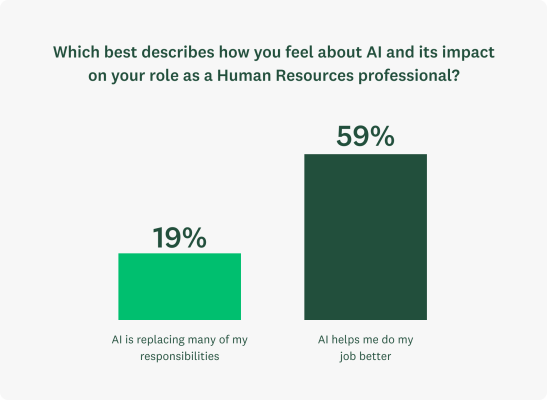
When it comes to using AI, HR professionals are most excited about productivity boosts: almost four in ten believe it will help them be able to focus on higher level tasks (38%), and 35% expect AI to automate repetitive tasks.
HR also has high hopes that AI will not only make their jobs easier but will also help them to perform better, by providing access to more data. Over a third (36%) hope AI will provide them with a data-driven understanding of employee performance.
37% of HR pros said AI will help them get real-time summaries and insights on HR metrics
Training and confidence levels need to increase
Despite the hype for AI, HR professionals also express concern on AI’s impact on HR, most notably lacking knowledge for how to harness the power of AI.
Over a third, (37%) say a lack of knowledge of how to effectively use AI is their main challenge when working with the technology, and 24% are concerned about not having enough data to feed into AI tools. And, on a personal level, 28% of HR pros fear for their job safety due to AI.
One thing HR is not as concerned about: bias in the recruiting and hiring process. Only one in four (25%) think bias introduced by AI is a big problem. Most think it’s a minor problem (45%) or not a problem at all (31%).
What you can do: Ask. Listen. Act.
There’s a lot more to learn about how HR can help companies build the workforce of the future. But one thing is for sure—a successful workplace is driven by employee feedback. Organizations that prioritize HR are reportedly more likely to support employee performance, training, and reap the benefits of that with increased retention and lower turnover.
The best starting point for HR? Ask, listen, then act.
Ask
Understand your employees and what they care about at every point in the employee lifecycle. From the candidate experience to onboarding, engagement to stay interviews and offboarding; there’s always a reason to collect feedback that can inform future decisions on HR programs, benefits, and communications.
Listen
Continuously gather feedback that uncovers the needs of individual employees, and can also be broadly applied to programs and processes, company wide. Create more effective training programs and workshops by collecting actionable feedback before, during, and after each session. Engage with employees often and at specific times so you have a benchmark for comparison.
Act
Build a high-performing workforce by putting feedback into action. Understand overall performance so you can improve manager effectiveness, address learning gaps, and empower your workforce. Get a 360-degree view of each stage of the employee experience.
Methodology: SurveyMonkey research was conducted between August 25 to September 5, 2023 among 269 human resource professionals. Respondents were selected from an online non-probability panel.¹
Get the insights you need to ask, listen, and act
Understand how your employees (really) feel so you can shape what’s next for your organization.
Discover more resources

HR toolkit: Make employee experience your competitive advantage
HR leaders can use this toolkit to help drive exceptional employee experiences.

How industry leaders use employee and customer feedback to drive innovation
How to use customer and employee feedback to drive innovation with insights from LinkedIn, FranklinCovey, and Hornblower.

Leveraging feedback to build inclusive workplaces: Insights from Lean In
Learn how to meet your DEI goals for a more inclusive workplace with Lean In and SurveyMonkey.

How Wave Deodorant launched its company with market research
Discover how Wave Deodorant validated product development and launched its company with market research insights from SurveyMonkey.